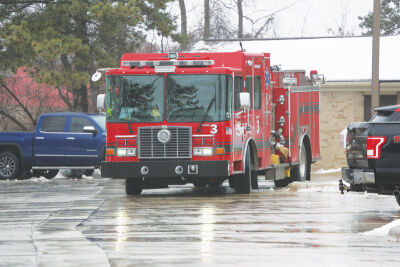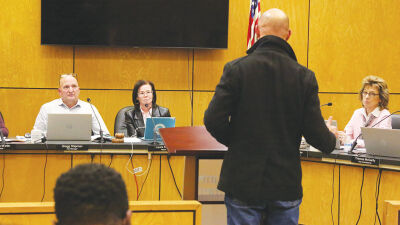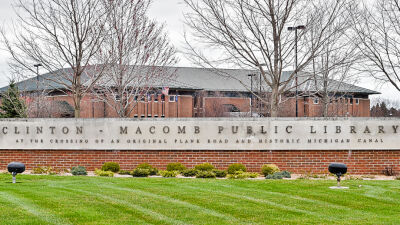
A fire truck sits outside of Clinton Township Fire Department Station 4. The Clinton Township Board of Trustees passed an ordinance to charge specified medical facilities for nonemergency calls.
Photo by Dean Vaglia
CLINTON TOWNSHIP — Businesses calling for emergency services in Clinton Township may be in for a shock soon.
The Clinton Township Board of Trustees approved a nonemergency lift assistance fee for assisted living, independent living, nursing homes and other facilities at its Jan. 22 meeting.
Township ordinance 488 establishes the ability for the township “to assess a service fee for the responses defined herein for non-emergency patient lift assists and providing other non-emergency services for residents at residential living facilities that market themselves as providing, or actually provide, on-site staff and services for their residents.” The fee is currently set at $500 for any lifts deemed nonemergency and is assessed for the sixth and all subsequent nonemergency calls.
The ordinance comes in response to several facilities in the township calling the Fire Department for transportation in cases where an emergency response was not required. While Clinton Township Fire Department Chief Tim Duncan said at a prior meeting the township was able to get facilities to agree to reduce nonemergency calls, not all facilities have complied.
“The whole purpose of the ordinance is not to be looked at as a revenue source; it’s for compliance with doing the right thing for their residents,” Duncan said.
Ordinance 488 only targets the facilities. Township residents will not be assessed a fee for using emergency services, and the fees will be assessed against infringing facilities and not its residents.
Water and sewer bill
Trustees increased overall water and sewer rates by 2.7% from $10.63 per 748 gallons to $10.92. The water usage charge went up 2.5% from $3.49 to $3.58 and the sewer usage charge went up 2.8% from $7.14 to $7.34. Readiness to serve charges increased to $8.09 for water and $6.16 for sewer.
Chipping discontinuation
Trustees voted 4-1 to end the township’s branch chipping program, with Treasurer Paul Gieleghem absent. The service will begin winding down in February with notices posted on the township website and water bills with the last day of curbside chipping for Monday, May 13, and the last day for dropping off branches at the Department of Public Works set for mid-July.
“We figure about 20% of Clinton Township uses this service,” said Township Supervisor Robert Cannon. “Some of us have never used it. Others use it a lot. Some people use it 10 or more times a year; what happens then is we get behind. We have a feeling that some people are using their yard to have businesses drop branches off to be chipped.”
Cannon estimates that continuing the program as-is would cost the township about $750,000 “over the next couple of years” to replace aging equipment and about $250,000 a year on workers for the program.
“We can’t afford to do it, and the reality is we have to watch the budget,” Trustee Julie Matuzak said. “We are the only township or city around that does this service. … Is it more inconvenient? Yeah. I lived in Mount Clemens for a long time, and I bundled my twigs and I put them in the brown bags, and I figured out what to do with all this stuff, as do people all around us.”
Ending the program is not the end of Clinton Township branch disposal. The township is currently working with GFL Environmental on bins for curbside branch pickup and chipping will still take place after extreme storms.
After hearing six residents speak about removal of the service, Trustee Tammy Patton cast the lone vote against ending it. Patton’s concerns for removing the service came down to having difficulty working with GFL’s customer service, her own history with the chipping program and uncertainty over how removing the service will affect residents. Patton recommended surveying residents to assess their level of awareness and interest in the service.
 Publication select ▼
Publication select ▼


























